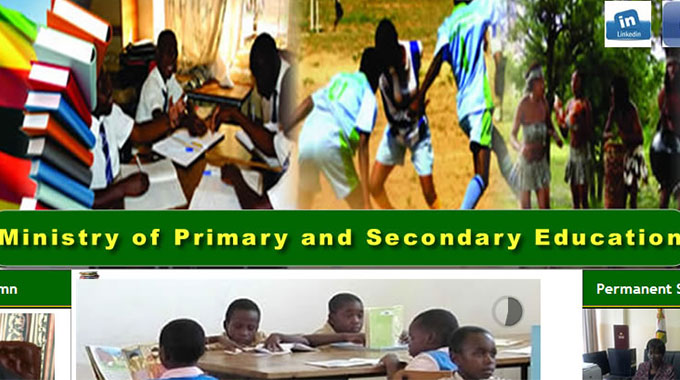Primary, secondary curriculum review consultations start

Nqobile Tshili – [email protected]
THE continuous assessment learning activities (CALA) are expected to be put under the spotlight as the Primary and Secondary Education Ministry conducts two-day curriculum review consultation meetings countrywide.
Players within the education sector will conduct their consultations today while external stakeholders who include of parents and guardians will participate tomorrow.
The ministry has invited stakeholders to visit schools and make contributions and recommendations on curriculum review.

The Ministry of Primary and Secondary Education
Yesterday schools sent out invitation letters to parents and guardians inviting them to participate in the consultation process saying even input from captains of industry will be captured during the process.
Pupils are also expected to make contributions.
Government is reviewing the competence-based education curriculum which was introduced in 2015 and its cycle ended last year.
CALA has been a thorny subject particularly to parents, guardians and pupils and it is expected to feature as curriculum review meetings start today.
Primary and Secondary Education communication and advocacy director Mr Taungana Ndoro said it is important for members of the public to participate in the curriculum review process.
He said the ministry wants to understand gaps that exist in the 2015 to 2022 curriculum so that they can be finetuned to conform to expectations.
“The successes of our competence-based curriculum are that we have been able to empower our kids, skills for life and work. This is evident from the innovations that we see throughout the country. We are seeing a lot of young people who are enterprising and are able to stand on their feet and feed themselves instead of looking for jobs,” he said.
Mr Ndoro said the ministry is aware of the concerns that have been raised especially regarding CALA and concerns will be taken into consideration.

CALA
“The gaps that are to be addressed are those that we want to hear from parents, guardians and pupils.
They will identify the gaps because we have not yet concluded the feedback process. We need to hear from the consultations what they feel the gaps are and after that we can come back to you to say these are the gaps that were brought forward by our stakeholders, teachers, parents and guardians,” said Mr Ndoro.
He said the successes that are derived in the implementation of the competence based curriculum may not be visible but will determine the country’s futuristic development.
Mr Ndoro said the public is thus encouraged to participate in the process.
“It is important for the public to participate in the curriculum review process because it helps shape the curriculum that is going to build Zimbabwe. It entails coming to us to give us their feedback, reviewing and telling us the gaps that they feel are there in the curriculum, things that they think may need improvement and things that they feel must be adjusted for the betterment of the country’s education sector,” said Mr Ndoro.

Nust
In an interview, educationist and Faculty of Science and Technology Education executive dean at the National University of Science and Technology (Nust) Professor Lwazi Sibanda said the competence-based curriculum has ushered in a generation of skilled learners, who do not just memorise theories just to pass their examinations.
She said in reviewing the curriculum, the education sector needs to address the shortcomings that come with CALA.
“The CALA issue needs to be addressed because you will find that the parents are the ones that are doing the assignments instead of the learners. The learners are the ones who are supposed to be doing that by themselves,” she said.
“The issue of continuous assessment should be clearly spelt out unlike what we are seeing now. Parents and guardians are complaining, it’s as if they are the ones who are learning. Even in the streets there are some placards where individuals will be advertising that they do CALA assignments.”
Prof Sibanda said CALA should enhance pupils’ ingenuity but this cannot be realised if parents and guardians are the ones doing the assignments.
She said curriculum reviews are necessary to weigh intended targets against outcomes while aligning with global trends.
“The curriculum review is important so that as a nation we might follow global trends in education. Education is dynamic not static. So, we need to keep it in line with global trends so that our learners acquire necessary skills that will help them in life,” she said.
“The good thing that has been brought about the curriculum is the hands-on approach. The competence-based curriculum speaks to what competencies do learners have when they leave school. It encourages learners to have skills unlike in the previous situation where pupils were expected to cram theories.”
Prof Sibanda said the stakeholder consultation will enable the ministry to listen to all the players that are involved in education. — @nqotshili












Comments